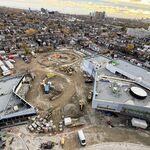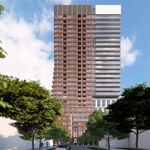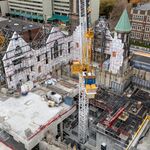MartinMtl
New Member
I'm the one who made the link, only because Montreal's tourism strategy take into account the city's orientation towards design through its architecture, stores, bars, hotels, etc. This doesn't mean that Montreal is better or more active in the design sector than Toronto, only that the city put an emphasis on that sector to attracts tourists who are interrested in design. Of course, being larger than Montreal, Toronto has more to offer. But when you take into account the difference in population and economic might of the two cities, Montreal fare pretty well.
The way i see it, Toronto and Montreal will grow more and more to become very different cities in ten to 15 years. And we'll all be the better for it, because we'll have two Canadian metropolis, with each one its own strengh. As a Montrealer, when I go to Toronto I have the sense of a city that is becoming futuristic and impressive for its sheer grandeur, while maintaining its funkyness. More and more, I will be able to skip New York when I want to experience a "very big city" rush, instead going to Toronto, which is closer and where I can use the same currency (yeah!) without having the pain of going through custom. Ten years ago, I don't think I would have make that choice (maybe because I didn't know Toronto well enough). Now I'm more and more excited everytime I'm planning a trip to Toronto. Being very much interrested in design and architecture, Toronto now seems like a must to me. And I think the city should put more emphasis on that to attract visitors. But that should not detract from the heritage side of Toronto. Everytime I go there, I wonder at the charms of Cabbagetown. Instead of focusing on the CN tower and the Eaton Center (a shopping mall, no matter how big and nice it is, remains a shopping center. Let Edmonton be the Canadian city where a shopping mall is the main attraction. Toronto has so much more to offer - same thing about Montreal's obsession with its so-called underground city; it's embarrassing).
As for Montreal, things are moving slower with more targeted efforts. We don't have the money to build an Opera house or large museum's expansion with star architects, so we concentrate on smaller interventions that adds up to make the city more and more beautiful and, therefore, more attractive to visitors. I'm always amaze by the transformations of Old Montreal, from a decrepit tourist trap 15 years ago to a wonderful, very well restaured historic district with tons of new restaurants, hotels, bars, art galleries and exlusive stores. Montreal takes advantage of what is has and goes from there to improve itself, slowly but surely. In 15 years, this city will be even smaller than Toronto, maybe with even less sheer energy, but it will become more beautiful than it ever was before, one street and one building at a time.
The way i see it, Toronto and Montreal will grow more and more to become very different cities in ten to 15 years. And we'll all be the better for it, because we'll have two Canadian metropolis, with each one its own strengh. As a Montrealer, when I go to Toronto I have the sense of a city that is becoming futuristic and impressive for its sheer grandeur, while maintaining its funkyness. More and more, I will be able to skip New York when I want to experience a "very big city" rush, instead going to Toronto, which is closer and where I can use the same currency (yeah!) without having the pain of going through custom. Ten years ago, I don't think I would have make that choice (maybe because I didn't know Toronto well enough). Now I'm more and more excited everytime I'm planning a trip to Toronto. Being very much interrested in design and architecture, Toronto now seems like a must to me. And I think the city should put more emphasis on that to attract visitors. But that should not detract from the heritage side of Toronto. Everytime I go there, I wonder at the charms of Cabbagetown. Instead of focusing on the CN tower and the Eaton Center (a shopping mall, no matter how big and nice it is, remains a shopping center. Let Edmonton be the Canadian city where a shopping mall is the main attraction. Toronto has so much more to offer - same thing about Montreal's obsession with its so-called underground city; it's embarrassing).
As for Montreal, things are moving slower with more targeted efforts. We don't have the money to build an Opera house or large museum's expansion with star architects, so we concentrate on smaller interventions that adds up to make the city more and more beautiful and, therefore, more attractive to visitors. I'm always amaze by the transformations of Old Montreal, from a decrepit tourist trap 15 years ago to a wonderful, very well restaured historic district with tons of new restaurants, hotels, bars, art galleries and exlusive stores. Montreal takes advantage of what is has and goes from there to improve itself, slowly but surely. In 15 years, this city will be even smaller than Toronto, maybe with even less sheer energy, but it will become more beautiful than it ever was before, one street and one building at a time.




